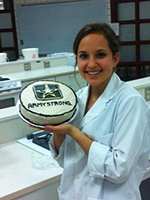

Nutrition Major
The Nutrition major at Miami University leads to the Bachelor of Science in Kinesiology, Nutrition, and Health degree.
Learn About the Concentrations
Students majoring in Nutrition study people’s nutritional needs and care. All students in the major complete the Nutrition Foundation and choose their career path by selecting a concentration, either the Dietetics Concentration for those students planning on becoming a registered dietitian (RD) or the Food & Nutrition for Pre-Health Professions (formerly Community Nutrition) for the non-RD path.


Food & Nutrition for Pre-Health Professions (formerly Community Nutrition)
Program Perspectives
Nutrition: From Classroom to Career
Choosing Miami: Madelyn's Journey
Student Learning Outcomes
With a major in nutrition students will be able to:
- Demonstrate how to use current technologies to locate, interpret, evaluate and use professional literature to make ethical, evidence-based practice decisions.
- Use the Nutrition Care Process to make decisions and identify nutrition-related problems, determine and evaluate nutrition interventions, develop an educational session or program/educational strategy for a target population and describe basic concepts of nutritional genomics.
- Explain the process involved in delivering quality food and nutrition services and apply management theories to the development of programs or services.
- Identify and describe the work of inter-professional teams and the roles of others with whom the registered dietitian/nutritionist collaborates in the delivery of food and nutrition service.
What Students Say
Cami Gilman

Nutrition major
"I love dietetics! I couldn't dream up a major that fits me better. I'm really into fitness and health, but even more than that I just love food! Working in the food lab, we get to make delicious treats that are good for you too…
Then in our other classes we learn about how and why they are good for you. There are so many job opportunities for Dietetics majors - from being a Registered Dietician to working in culinary arts. Right now, I'm looking to go to culinary school after graduation."
Sarah Heaven

Community Nutrition major
“I chose to major in Community Nutrition to gain a well- rounded approach to health care. The program allows me to be knowledgeable about biological processes in the body, as well as how to help guide individuals in choosing how they fuel their bodies. During my time at Miami, I’ve learned that “food is medicine” and many diseases could be prevented or progression slowed by changing diet.”